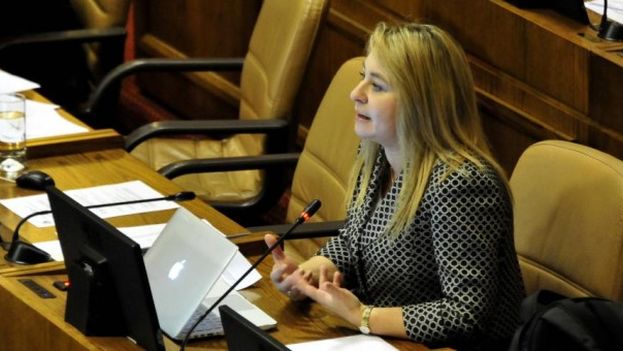
![]() 14ymedio, Havana, 7 November 2015 – Critics of the potential arrival of Cuban doctors in Chile have raised their tone in recent weeks in the South American country. Marisol Turres, national deputy from the Independent Democratic Union (UDI) party, denounced that the situation is almost one of “human trafficking” and questioned the conditions imposed by the Cuban government on its doctors working in Chile.
14ymedio, Havana, 7 November 2015 – Critics of the potential arrival of Cuban doctors in Chile have raised their tone in recent weeks in the South American country. Marisol Turres, national deputy from the Independent Democratic Union (UDI) party, denounced that the situation is almost one of “human trafficking” and questioned the conditions imposed by the Cuban government on its doctors working in Chile.
The proposal to contract for Cuban doctors has been pushed by Alejandor Navarro, a senator from the Broad Social Movement (MAS), who, at the end of September, was backed by the majority of mayors in the country. However, the Chilean Association of Medical Faculties (ASOFAMECH) clarified that while it was not opposed to the arrival of the professionals, they must past the Unified National Examination of Medical Knowledge (Eunacom).
The Chilean Medical Faculties have warned that, of the 787 doctors licensed in Cuba, equally split between Chileans and foreigners residing in the country, of those who have so far taken the theory section of the national examination, only 23.5% have passed on the first attempt, and an additional 12% have managed to pass on the second, third or even the fourth attempt.
Those who are concerned about the arrival of the physicians, as is the case with UDI deputy Turres, also demand that the Ministry of Health (Minsal) pressure the Meidcal College to train specialists and oblige the scholarship students to work in public service when they finish university.
The deputy laments that “it is a terrible violation of human rights, because the Cuban government expropriates a large portion of their salaries, and their families must stay in Cuba
Although she declared she is not against the initiative, in addition to her concern about “human trafficking,” Turres laments that “it is a terrible violation of human rights, because the Cuban government expropriates a large portion of their salaries, and their families must stay in Cuba… Let them come with their families and keep 100% of the payments from the State of Chile and not have most of their pay taken by the country they come from.”
At the end of September, 225 mayors delivered a letter to the branch ministry, which supports the arrival of the Cuban doctors to make up for a deficit of 3,795 doctors, and to resolve “the waiting lists, while Chile trains its specialists.”
While the debate heats up in Chile, thousands of health professionals on the island dream of a new “medical mission” abroad, which allows them to earn higher incomes. For the Cuban government it is a lucrative business, since the export of health services to some 40 countries represents 64% of total income from services. According to the director of the Commercialization of Medical Services, Yilian Jimenez, Cuba expects to gross more than 8.2 billion dollars from the program in 2015.
